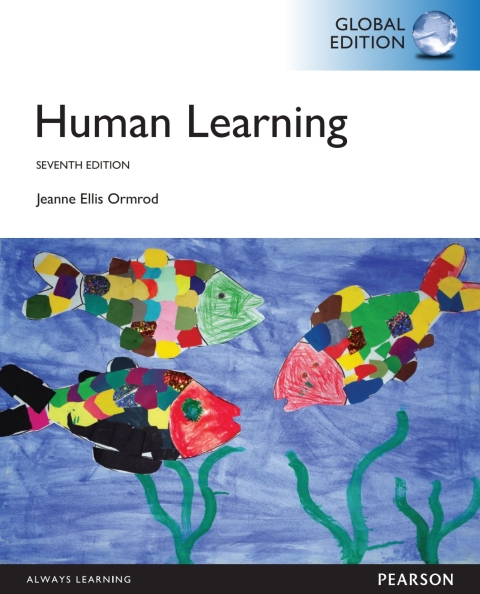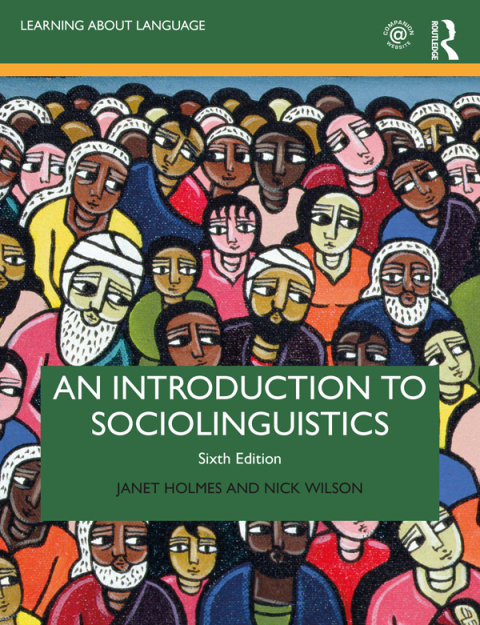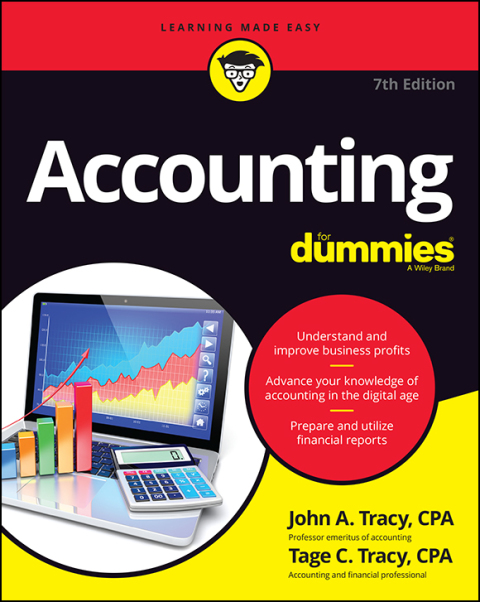Description
Efnisyfirlit
- Half Title Page
- Copyright
- Dedication
- Preface
- Brief Contents
- Contents
- PART ONE: INTRODUCTION TO HUMAN LEARNING
- CHAPTER 1: LEARNING: DEFINITION, PRINCIPLES, AND THEORIES
- LEARNING OUTCOMES
- THE IMPORTANCE OF LEARNING
- DEFINING LEARNING
- DETERMINING WHEN LEARNING HAS OCCURRED
- TYPES OF LEARNING RESEARCH
- LEARNING PRINCIPLES AND THEORIES
- How Theories of Learning Have Evolved over Time
- Advantages of Theories
- Potential Drawbacks of Theories
- A Perspective on Theories and Principles
- APPLYING KNOWLEDGE ABOUT LEARNING TO INSTRUCTIONAL PRACTICES
- OVERVIEW OF THE BOOK
- SUMMARY
- CHAPTER 2: THE NERVOUS SYSTEM AND LEARNING
- LEARNING OUTCOMES
- BASIC BUILDING BLOCKS OF THE HUMAN NERVOUS SYSTEM
- Neurons
- Synapses
- Glial Cells
- BRAIN STRUCTURES AND FUNCTIONS
- Methods in Brain Research
- Parts of the Brain
- The Left and Right Hemispheres
- Interconnectedness of Brain Structures
- DEVELOPMENT OF THE BRAIN
- Prenatal Development
- Development in Infancy and Early Childhood
- Development in Middle Childhood, Adolescence, and Adulthood
- Factors Influencing Brain Development
- To What Extent Are There Critical or Sensitive Periods in Brain Development?
- To What Extent Is the Brain “Prewired” to Know or Learn Things?
- THE NEUROLOGICAL BASIS OF LEARNING
- EDUCATIONAL IMPLICATIONS OF BRAIN RESEARCH
- SUMMARY
- PART TWO: BEHAVIORIST VIEWS OF LEARNING
- CHAPTER 3: BEHAVIORISM
- LEARNING OUTCOMES
- BASIC ASSUMPTIONS IN BEHAVIORISM
- CLASSICAL CONDITIONING
- Classical Conditioning in Human Learning
- Common Phenomena in Classical Conditioning
- Eliminating Unproductive Classically Conditioned Responses
- OPERANT CONDITIONING
- Important Conditions for Operant Conditioning to Occur
- Contrasting Operant Conditioning with Classical Conditioning
- Forms That Reinforcement Might Take
- Common Phenomena in Operant Conditioning
- Effects of Antecedent Stimuli and Responses in Operant Conditioning
- Avoidance Learning
- PUNISHMENT
- Potentially Effective Forms of Punishment
- Ineffective Forms of Punishment
- COGNITION AND MOTIVATION IN BEHAVIORIST THEORIES
- SUMMARY
- CHAPTER 4: APPLICATIONS OF BEHAVIORIST PRINCIPLES
- LEARNING OUTCOMES
- APPLYING BEHAVIORIST PRINCIPLES TO CLASSROOM MANAGEMENT
- Creating a Productive Classroom Climate
- Concerns about Using Reinforcement and Punishment in Classroom Settings
- Using Reinforcement to Increase Productive Behaviors
- Strategies for Decreasing Undesirable Behaviors
- APPLIED BEHAVIOR ANALYSIS (ABA)
- Frequently Used ABA Strategies
- Using ABA with Large Groups
- Adding a Cognitive Component to ABA
- IMPLICATIONS OF BEHAVIORISM FOR CLASSROOM INSTRUCTION AND ASSESSMENT
- Importance of Making Active Responses
- Identifying Instructional Goals and Objectives
- Programmed Instruction and Computer-Assisted Instruction
- Mastery Learning
- School Assessment Practices
- WHEN BEHAVIORIST APPROACHES ARE MOST USEFUL
- SUMMARY
- PART THREE: SOCIAL COGNITIVE THEORY
- CHAPTER 5: SOCIAL COGNITIVE THEORY
- LEARNING OUTCOMES
- GENERAL PRINCIPLES OF SOCIAL COGNITIVE THEORY
- Environmental Factors in Social Cognitive Theory: Revisiting Reinforcement and Punishment
- Cognitive Factors in Social Cognitive Theory
- Reciprocal Causation
- MODELING
- How Modeling Affects Behavior
- Characteristics of Effective Models
- Behaviors That Can Be Learned through Modeling
- Conditions Necessary for Effective Modeling to Occur
- SELF-EFFICACY
- How Self-Efficacy Affects Behavior and Cognition
- Factors in the Development of Self-Efficacy
- SELF-REGULATION
- Elements of Self-Regulation
- Promoting Self-Regulated Behavior
- The Cognitive Side of Self-Regulation
- EDUCATIONAL IMPLICATIONS OF SOCIAL COGNITIVE THEORY
- SUMMARY
- PART FOUR: COGNITIVE VIEWS OF LEARNING
- CHAPTER 6: COGNITIVISM
- LEARNING OUTCOMES
- BASIC ASSUMPTIONS IN COGNITIVE PERSPECTIVES
- EDWARD TOLMAN’S PURPOSIVE BEHAVIORISM
- GESTALT PSYCHOLOGY
- VERBAL LEARNING RESEARCH
- CONTEMPORARY COGNITIVE PERSPECTIVES
- Information Processing Theory
- Constructivism
- Contextual Theories
- Integrating Cognitively Oriented Perspectives
- GENERAL EDUCATIONAL IMPLICATIONS OF COGNITIVIST APPROACHES
- SUMMARY
- CHAPTER 7: MEMORY AND ITS COMPONENTS
- LEARNING OUTCOMES
- A DUAL-STORE MODEL OF MEMORY
- Sensory Register
- Moving Information to Working Memory: The Role of Attention
- Working Memory
- Moving Information to Long-Term Memory: Connecting New Information with Prior Knowledge
- Long-Term Memory
- CHALLENGES TO THE DUAL-STORE MODEL
- Are Working Memory and Long-Term Memory Really Different?
- Is Conscious Thought Necessary for Long-Term Memory Storage?
- ALTERNATIVE VIEWS OF HUMAN MEMORY
- Levels of Processing
- Activation
- REMEMBERING THAT THE MAP IS NOT THE TERRITORY
- GENERALIZATIONS ABOUT MEMORY AND THEIR EDUCATIONAL IMPLICATIONS
- SUMMARY
- CHAPTER 8: LONG-TERM MEMORY STORAGE AND RETRIEVAL PROCESSES
- LEARNING OUTCOMES
- STORAGE AS A CONSTRUCTIVE PROCESS
- Examples of Construction in Action
- LONG-TERM MEMORY STORAGE PROCESSES
- Rehearsal
- Meaningful Learning
- Internal Organization
- Elaboration
- Visual Imagery
- How Procedural Knowledge Is Acquired
- FACTORS AFFECTING LONG-TERM MEMORY STORAGE
- Working Memory
- Prior Knowledge
- Prior Misconceptions
- Expectations
- Verbalization
- Enactment
- Repetition and Review
- LONG-TERM MEMORY RETRIEVAL PROCESSES
- Importance of Context for Retrieval
- Construction in Retrieval
- The Power of Suggestion: Effects of Subsequently Presented Information
- Constructing Entirely New “Memories” during Retrieval
- Remembering Prior Recollections
- FORGETTING
- Decay
- Interference and Inhibition
- Repression
- Failure to Retrieve
- Construction Error
- Insufficient Self-Monitoring during Retrieval
- Failure to Store or Consolidate
- PROMOTING EFFECTIVE LONG-TERM MEMORY STORAGE AND RETRIEVAL PROCESSES
- SUMMARY
- CHAPTER 9: KNOWLEDGE
- LEARNING OUTCOMES
- THE VARIOUS KINDS OF KNOWLEDGE
- Declarative and Procedural Knowledge
- Explicit and Implicit Knowledge
- HOW KNOWLEDGE IS ENCODED IN LONG-TERM MEMORY
- Encoding in Terms of Physical Characteristics
- Encoding in Terms of Actions
- Encoding in Terms of Symbols
- Encoding in Terms of Meanings
- Different Forms of Encoding Are Not Mutually Exclusive
- THE ORGANIZATION OF LONG-TERM MEMORY
- Long-Term Memory as a Hierarchy
- Long-Term Memory as a Network
- Parallel Distributed Processing
- CONCEPTS
- Theories of Concept Learning
- Factors Facilitating Concept Learning
- SCHEMAS AND SCRIPTS
- PERSONAL THEORIES
- Personal Theories versus Reality
- Fostering Theory Development
- WORLDVIEWS
- THE CHALLENGE OF CONCEPTUAL CHANGE
- Promoting Conceptual Change
- DEVELOPMENT OF EXPERTISE
- GENERALIZATIONS ABOUT THE NATURE OF KNOWLEDGE
- SUMMARY
- PART FIVE: DEVELOPMENTAL AND CONTEXTUAL PERSPECTIVES
- CHAPTER 10: COGNITIVE-DEVELOPMENTAL PERSPECTIVES
- LEARNING OUTCOMES
- PIAGET’S THEORY OF COGNITIVE DEVELOPMENT
- Key Ideas in Piaget’s Theory
- Piaget’s Stages of Cognitive Development
- CURRENT PERSPECTIVES ON PIAGET’S THEORY
- Capabilities of Different Age-Groups
- Effects of Experience and Prior Knowledge
- Effects of Culture
- Views on Piaget’s Stages
- NEO-PIAGETIAN THEORIES OF COGNITIVE DEVELOPMENT
- Case’s Theory
- IMPLICATIONS OF PIAGETIAN AND NEO-PIAGETIAN THEORIES
- SUMMARY
- CHAPTER 11: SOCIOCULTURAL THEORY AND OTHER CONTEXTUAL PERSPECTIVES
- LEARNING OUTCOMES
- VYGOTSKY’S THEORY OF COGNITIVE DEVELOPMENT
- Key Ideas in Vygotsky’s Theory
- Comparing Piaget’s and Vygotsky’s Theories
- CURRENT PERSPECTIVES ON VYGOTSKY’S THEORY
- Social Construction of Meaning
- Scaffolding
- Participation in Adult Activities
- Apprenticeships
- Acquisition of Teaching Skills
- Dynamic Assessment
- ADDING A SOCIOCULTURAL ELEMENT TO INFORMATION PROCESSING THEORY
- Intersubjectivity
- Social Construction of Memories
- Collaborative Use of Cognitive Strategies
- EXPANDING THE CONTEXTUALIST FRAMEWORK
- Embodiment
- Situated and Distributed Learning and Cognition
- Ecological Systems Theory
- GENERAL IMPLICATIONS OF SOCIOCULTURAL AND OTHER CONTEXTUALIST THEORIES
- PEER-INTERACTIVE INSTRUCTIONAL STRATEGIES
- Class Discussions
- Reciprocal Teaching
- Cooperative Learning
- Peer Tutoring
- Communities of Learners
- Technology-Based Collaborative Learning
- SUMMARY
- PART SIX: COMPLEX LEARNING AND COGNITION
- CHAPTER 12: LEARNING AND STUDYING EFFECTIVELY
- LEARNING OUTCOMES
- METACOGNITIVE KNOWLEDGE AND SKILLS
- SELF-REGULATED LEARNING
- Roots of Self-Regulated Learning
- EFFECTIVE LEARNING AND STUDY STRATEGIES
- Meaningful Learning, Organization, and Elaboration
- Note Taking
- Identifying Important Information
- Summarizing
- Comprehension Monitoring
- Mnemonics
- DEVELOPMENT OF METACOGNITIVE KNOWLEDGE AND SKILLS
- EPISTEMIC BELIEFS
- Developmental and Cultural Differences in Epistemic Beliefs
- Effects of Epistemic Beliefs
- THE INTENTIONAL LEARNER
- WHY STUDENTS DON’T ALWAYS USE EFFECTIVE STRATEGIES
- PROMOTING EFFECTIVE LEARNING AND STUDY STRATEGIES
- SUMMARY
- CHAPTER 13: TRANSFER, PROBLEM SOLVING, AND CRITICAL THINKING
- LEARNING OUTCOMES
- TRANSFER
- Types of Transfer
- Theories of Transfer
- Factors Affecting Transfer
- PROBLEM SOLVING
- Theories of Problem Solving
- Cognitive Factors Affecting Successful Problem Solving
- Problem-Solving Strategies
- Meaningless versus Meaningful Problem Solving
- FACILITATING TRANSFER AND PROBLEM SOLVING IN INSTRUCTIONAL SETTINGS
- CRITICAL THINKING
- Developmental, Individual, and Cultural Differences in Critical Thinking
- Fostering Critical Thinking in the Classroom
- SUMMARY
- PART SEVEN: MOTIVATION
- CHAPTER 14: MOTIVATION, AFFECT, AND THEIR EFFECTS
- LEARNING OUTCOMES
- GENERAL EFFECTS OF MOTIVATION
- Extrinsic versus Intrinsic Motivation
- BASIC HUMAN NEEDS
- Drive Reduction
- Arousal
- Maslow’s Hierarchy of Needs
- Competence and Self-Worth
- Autonomy
- Relatedness and Belonging
- INDIVIDUAL DIFFERENCES IN MOTIVATION
- Need for Approval
- Need for Achievement
- Sense of Identity
- Dispositions
- AFFECT AND ITS EFFECTS
- How Affect Is Related to Motivation
- How Affect Is Related to Cognition and Learning
- Anxiety
- CREATING A MOTIVATING AND AFFECT-FRIENDLY CLASSROOM ENVIRONMENT
- SUMMARY
- CHAPTER 15: COGNITIVE FACTORS IN MOTIVATION
- LEARNING OUTCOMES
- INTERESTS
- Effects of Interest
- Factors Promoting Interest
- EXPECTANCIES AND VALUES
- Effects of Expectancies and Values
- Factors Influencing Expectancies and Values
- GOALS
- Achievement Goals
- Work-Avoidance and Doing-Just-Enough Goals
- Social Goals
- Career Goals
- Coordinating Multiple Goals
- ATTRIBUTIONS
- Effects of Attributions
- Factors Influencing the Nature of Attributions
- Explanatory Style: Mastery Orientation versus Learned Helplessness
- MOTIVATION, AFFECT, AND SELF-REGULATION
- How Motivation and Affect Are Intertwined with Self-Regulation
- Internalized Motivation
- ENCOURAGING MOTIVATING COGNITIONS
- A TARGETS Mnemonic for Motivational Strategies
- SUMMARY
- REFERENCES
- NAME INDEX
- SUBJECT INDEX






Reviews
There are no reviews yet.